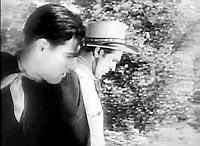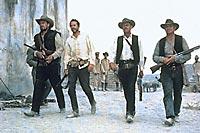Howdy, pardner! Love stories about manly men go way back

You'd think people had never laid eyes on a gay cowboy before.
Weeks after "Brokeback Mountain's" release, a Poulsbo theater, along with one in Utah, still makes national news for shunning the movie, even though most critics love it, it ruled at the Golden Globes and it's a bona fide success at the box office.
Still can't wrap your head around the concept of gay cowboys? Got news for you, pardner: You've been watching them all your life.
The cowboys in a lot of classics may not be explicitly getting it on like the "Brokeback" boys, but there's no denying the obviousness of what you could delicately call a strong homoerotic subtext.
It doesn't take a decoder ring or a social/political agenda to spot the signals, whether you're straight or gay, a Western buff or tenderfoot. And I'm not even talking about Robert Conrad's tight little outfit in the old "The Wild Wild West" TV series.
Bearing that in mind, though, few things chafe like people who find innuendo in any situation. They're "The Magnificent Seven," not "The Fabulous Seven."
There's a fine line that separates male bonding and, well, the "Lord of the Rings" films. Try not to do a double-take at the affectionate exchanges between Hobbits Merry and Pippin. This subtext business crops up in any overly macho genre populated mostly by men. But trust me, I've put in some time in the saddle and rustled up a few classic Westerns that really are love stories between men. Manly men.
"Red River" (1948) Howard Hawks' classic was already notorious before the 1995 documentary "The Celluloid Closet" outed it. See the flirting between cowboys Montgomery Clift and John Ireland while admiring each other's pistols. Ireland's character, Cherry (!), says, "There are only two things more beautiful than a gun: a Swiss watch or a woman from anywhere. Ever had a good ... Swiss watch?"
Later, damsel Tess Millay (Joanne Dru) hollers at feuding Clift and John Wayne, above: "Anybody with half a mind would know you two love each other."
Hawks' "Rio Bravo" (1959) isn't as overt. Sheriff John T. Chance (John Wayne) relies on alcoholic Dude (Dean Martin), cranky old Stumpy (Walter Brennan) and handsome young Colorado (Ricky Nelson) to fend off thugs trying to break a murderer out of jail.
Take a gander at the looks on the faces of Dude and Colorado as they sing — to each other. Or the way they walk down the street whistling together at the end, and the way Dude opens a door for his new companion.
"Hawks' camera does cast a pretty queer eye on the young Rick Nelson — but that could be there as much for the girls as for the boys," says Robert Cumbow, the Seattle-based author of "Once Upon a Time: The Films of Sergio Leone."
"Arguably the gayest thing in the film is Walter Brennan's fussy old Stumpy, constantly bickering at John T. (while doing his housekeeping for him) as if he were genuinely jealous of the sheriff's relationships with younger men." Could that have anything to do with the playful kiss Johnny T. plants on the top of Stumpy's noggin?
"The Virginian" (1929, not on DVD): In the swishiest of several versions, Gary Cooper plays The V, and he wants to know why his friend Steve (Richard Arlen) is hanging around with that black-hatted tramp Trampas (Walter Huston), who's seducing him to the dark side.
"Why didn't you wait for me?" The V asks when he sees Steve with Trampas at a party. "You ain't very choosy about your company."
"Maybe you'll explain what you mean by that," Trampas retorts.
Catfight over a guy!
"You and I done a lot of loco things," The V later tells Steve, as he puts his hand on Steve's leg, leaves it there a really long time, then slowly slides it off.
Note the smoldering glances between the two men, below, as Steve awaits hanging for what he's been up to with that dirty Trampas (cattle-rustlin'). After frontier justice is served, The V opens Steve's note: "Goodbye. I couldn't have spoke to you without playing the baby." And his expression: Naughty? Furtive?
The V also has a dumpy male friend named Honey, who issues this bon mot about another character: "... the guy that's bossin' this spread ain't no common cow thief. He's cuter'n a mountain goat in springtime."
"The Wild Bunch" (1969, R), just out in a magnificent two-disc special edition from Warner's must-have "Sam Peckinpah's The Legendary Westerns Collection," which also includes "Ride the High Country" (1962), "The Ballad of Cable Hogue" (1970) and "Pat Garrett and Billy the Kid" (1973, R).
Don't let the bloodshed distract you. Dutch (Ernest Borgnine) clearly has a man-crush on gang leader Pike (William Holden) and meets his maker with the other man's name on his lips. Ex-Bunch member Deke (Robert Ryan) pursues Pike with the determination of an old girlfriend.
"Ride the High Country" (1962): Aging cowboy stars Randolph Scott and Joel McCrea are like an old married couple as they bed down in a barn in their union suits. Scott removes McCrea's coat for him before a fight and puts it back on afterward.
Scott snaps at McCrea about rescuing damsel-in-distress Mariette Hartley: "She stays here! We're packing gold, not petticoats." And when they do rescue her from hilljack predators, they change her from a fancy dress into guy's clothes!
Which brings us to "Johnny Guitar" (1954, not on DVD). "I've never seen a woman that was more a man," a bartender says of Joan Crawford's Vienna character, perhaps named after those little sausages. She dresses and holds a gun like a man. And just so's you know who's in charge, her suitor goes by the moniker The Dancin' Kid. Some crowd: The Kid's pal, Bart (Ernest Borgnine), explicitly doesn't like women, and is even mean to horses.
"7 Men" director Budd Boetticher's Westerns with Randolph Scott might be on the "Brokeback" guys' Netflix list if they were in print. (They crop up regularly on cable's The Westerns Channel.) Rumors were widespread about Scott and Cary Grant, who lived together a dozen years.
In "The Tall T" (1957), bad guy Richard Boone takes a shine to his capable hostage, Scott, offers Scott a life with him, and gets exceedingly nasty at the rejection. "Commanche Station" (1960) features another catfight — over a particularly sensitive cowboy named Dobie (Richard Rust). After Scott makes his intent to steal him away from villain Claude Akins, Akins remarks, "That Dobie, kind of runs on the gentle side, don't he?"
In an interview published last month in the online film magazine GreenCine (www.greencine.com), Seattle-based writer Sean Axmaker asked Boetticher, "You've described the relationships between Randolph Scott and villains as a love story between two men."
"Well, it is," Boetticher said. "A man is the all-American sheriff. He does good and he's a clean, loving guy and he's a helluva fast draw, and he can punch and he can ride a horse and he can do all the things that the villain can do, but the villain thinks back and he says, 'Damn it, we live 60 miles apart and if I'd have lived next door to him, we'd have been partners and here we are trying to kill each other. But I really admire that guy.'
"Never before in a motion picture Western did you ever see the hero kill the villain and sit down on a rock because he wanted to throw up because he really hated to do it. And I think that's a love affair."
And this doesn't even begin to get into the singing cowboys.
Mark Rahner: 206-464-8259 or mrahner@seattletimes.com

